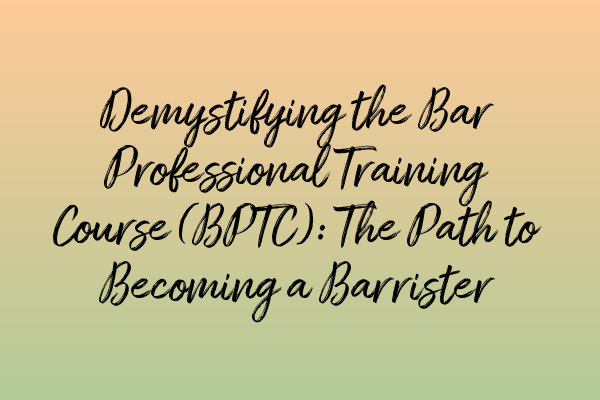Demystifying the Bar Professional Training Course (BPTC): The Path to Becoming a Barrister
Are you considering a career as a barrister? The path to becoming a barrister is an exciting and challenging one. One of the crucial steps along this journey is completing the Bar Professional Training Course, or BPTC. In this comprehensive guide, we will demystify the BPTC and provide you with all the information you need to know to navigate this important stage in your legal career.
What is the BPTC?
The BPTC is a vocational course that aspiring barristers in England and Wales must undertake after completing their undergraduate law degree and before commencing pupillage. It is designed to equip students with the practical skills and knowledge necessary to thrive in the demanding world of barrister practice.
During the BPTC, you will gain invaluable experience in the key areas of advocacy, drafting, legal research, and interviewing. These skills are essential for barristers, as they are regularly required to argue cases in court, prepare legal documents, and advise clients on various legal matters.
Eligibility and Application Process
In order to be eligible for the BPTC, you must have completed an undergraduate law degree (or equivalent) and meet the entry requirements set by the individual course providers. It is important to note that competition for places on the BPTC is fierce. Therefore, it is advisable to start the application process early and thoroughly research the different course providers and their entry requirements.
Once you have identified the BPTC provider that suits your needs, you will need to submit an application through the Bar Council’s centralised online system. The application typically involves providing your academic qualifications, personal statement, and references. It is essential to present yourself as a committed and motivated candidate who possesses the necessary skills and attributes to excel in the legal profession.
Before finalising your application, spend some time polishing your personal statement. This is your opportunity to showcase your passion for the law, any relevant work experience, and any extracurricular activities that demonstrate your commitment to justice and legal advocacy. Remember to tailor your personal statement to each BPTC provider you apply to, highlighting why you believe their specific program is the right fit for you.
The Structure of the BPTC
The BPTC is typically a one-year full-time course, although part-time options may be available. The structure and curriculum of the BPTC can vary slightly between different providers, but the core elements remain fairly consistent.
The course is divided into three parts: the Foundation modules, the Inns of Court modules, and the Electives.
1. Foundation Modules
The Foundation modules form the building blocks of the BPTC and cover essential areas of legal practice. These modules include:
- Civil Litigation: Understanding the civil court process and practicing basic advocacy skills.
- Criminal Litigation: Exploring criminal law and procedure, and learning how to conduct a criminal trial.
- Professional Ethics: Understanding the ethical considerations that barristers must navigate in their practice.
- Opinion Writing and Drafting: Developing skills in writing legal opinions and drafting legal documents.
- Advocacy: Learning the art of persuasive oral presentations, including both written and verbal advocacy.
Successful completion of the Foundation modules is typically assessed through written exams, advocacy exercises, and coursework assignments.
2. Inns of Court Modules
After completing the Foundation modules, you will move on to the Inns of Court modules. This stage of the BPTC focuses on more advanced areas of advocacy and professional development.
These modules are provided by the four Inns of Court (Inner Temple, Middle Temple, Lincoln’s Inn, and Gray’s Inn) and take place within the historic buildings of these prestigious institutions. The Inns of Court modules include:
- Criminal Litigation II: Building on the foundation laid in the earlier module, this module delves deeper into complex criminal cases and advanced advocacy techniques.
- Civil Litigation II: Expanding on the knowledge gained in the first module, this module explores more intricate civil litigation scenarios.
- Conference Skills: Developing the ability to effectively communicate and negotiate with clients and other legal professionals.
- Resolution of Disputes Out of Court: Exploring alternative dispute resolution methods, such as mediation and negotiation.
Assessment of the Inns of Court modules varies, but typically includes practical assessments, written assignments, and oral advocacy exercises.
3. Electives
In the final stage of the BPTC, you will have the opportunity to specialize in specific areas of law through the Elective modules. These modules allow you to tailor your training to suit your career aspirations and areas of interest.
Elective modules cover a wide range of legal areas, including family law, commercial law, public law, and more. You will be required to choose a set number of Elective modules to complete, providing you with a solid foundation in your chosen field(s) of expertise.
Assessment of the Elective modules follows a similar pattern to the previous stages and includes a mix of written exams, oral assessments, and practical exercises.
Conclusion
The Bar Professional Training Course is an exciting and vital step on the path to becoming a barrister. By successfully completing the BPTC, you will acquire the practical skills and knowledge necessary to embark on a rewarding career in the legal profession. Remember to research the different course providers, familiarise yourself with the entry requirements, and present yourself as a committed and motivated candidate in your application.
For further reading on related legal topics, we recommend our other articles:
- Private Prosecutions: Exploring Non-Governmental Prosecutions in Criminal Cases
- Understanding Drug-related Offences: Laws and Penalties in the UK
- Demystifying Criminal Law Procedures: A Step-by-Step Guide
- Rights of the Accused: Protecting Individual Liberties in Criminal Proceedings
- Magistrates’ Court vs Crown Court: Understanding Key Differences


Leave a Reply